

Ancient Greece for Kids - Myths, Gods, Wars, People, School, Pets, Vases, Columns, Democracy, Games, Geography, ore. Ancient Greece for Kids - Kidipede. Ancient Greece - Culture and Society in the Ancient Greek World. Men if they were not training in military, or discussing politics went to the Theatre for entertainment.
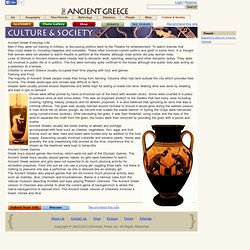
To watch dramas that they could relate to, including tragedies and comedies. These often involved current politics and gods in some form. It is thought that women were not allowed to watch theatre or perform at the theatre, although male actors did play women roles. Lives of Women in Ancient Greece were closely tied to domestic work, spinning, weaving and other domestic duties. They were not involved in public life or in politics. Children in ancient Greece usually occupied their time playing with toys and games. Farming and Food The majority of Ancient Greek people made their living from farming. Olives were either picked by hand or knocked out of the tress with wooden sticks. Ancient Greeks usually ate bread (barley or wheat) and porridge, accompanied with food such as cheese, vegetables, fish, eggs and fruit. Greek Food FAQ: What Did the Ancient Greeks Eat? Question About Ancient Greek Foods. Question: What Did the Ancient Greeks Eat?
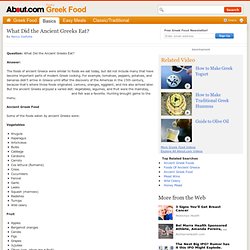
Answer: The foods of ancient Greece were similar to foods we eat today, but did not include many that have become important parts of modern Greek cooking. For example, tomatoes, peppers, potatoes, and bananas didn't arrive in Greece until after the discovery of the Americas in the 15th century, because that's where those foods originated. Lemons, oranges, eggplant, and rice also arrived later. But the ancient Greeks enjoyed a varied diet. Greek Culture. Religion The ancient Greeks were a deeply religious people.
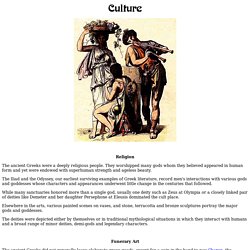
They worshipped many gods whom they believed appeared in human form and yet were endowed with superhuman strength and ageless beauty. The Iliad and the Odyssey, our earliest surviving examples of Greek literature, record men's interactions with various gods and goddesses whose characters and appearances underwent little change in the centuries that followed. While many sanctuaries honored more than a single god, usually one deity such as Zeus at Olympia or a closely linked pair of deities like Demeter and her daughter Persephone at Eleusis dominated the cult place. Elsewhere in the arts, various painted scenes on vases, and stone, terracotta and bronze sculptures portray the major gods and goddesses.
The deities were depicted either by themselves or in traditional mythological situations in which they interact with humans and a broad range of minor deities, demi-gods and legendary characters. Funerary Art Men Women Children Pets Diet. Food in Ancient Greece. The Greek diet consisted of foods that were easily raised in the rocky terrain of Greece’s landscape.
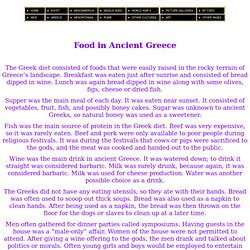
Breakfast was eaten just after sunrise and consisted of bread dipped in wine. Lunch was again bread dipped in wine along with some olives, figs, cheese or dried fish. Supper was the main meal of each day. It was eaten near sunset. Bg10.pdf (application/pdf Object) Greek History. Ancient Greece Timeline According to archaeological and historical sources the story of Greece began deep in prehistory, and has continued to our days.
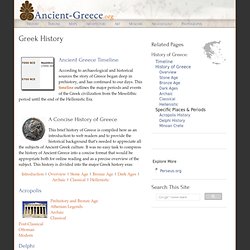
This timeline outlines the major periods and events of the Greek civilization from the Mesolithic period until the end of the Hellenistic Era. A Concise History of Greece This brief history of Greece is compiled here as an introduction to web readers and to provide the historical background that’s needed to appreciate all the subjects of Ancient Greek culture. It was no easy task to compress the history of Ancient Greece into a concise format that would be appropriate both for online reading and as a precise overview of the subject. Introduction | Overview | Stone Age | Bronze Age | Dark Ages | Archaic | Classical | Hellenistic Acropolis Prehistory and Bronze Age Athenian Legends Archaic Classical Post-Classical Ottoman Modern Delphi Delphi was inhabited since Mycenaean times (14th - 11th c. Minoan Crete. ANCIENT GREEK THEATRE. Ancient Greek Theatre Background on Ancient Greek Theatre Many people have misconceptions about the ancient Greek theatre.
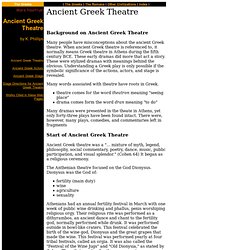
When ancient Greek theatre is referenced to, it normally means Greek theatre in Athens during the fifth century BCE. These early dramas did more that act a story. These were stylized dramas with meanings behind the obvious. Many words assoiated with theatre have roots in Greek. theatre comes for the word theatron meaning "seeing place" drama comes form the word dran meaning "to do" Many dramas were presented in the theate in Athens, yet only forty-three plays have been found intact. Ancient Greece for Kids - Woodlands Homework Help.